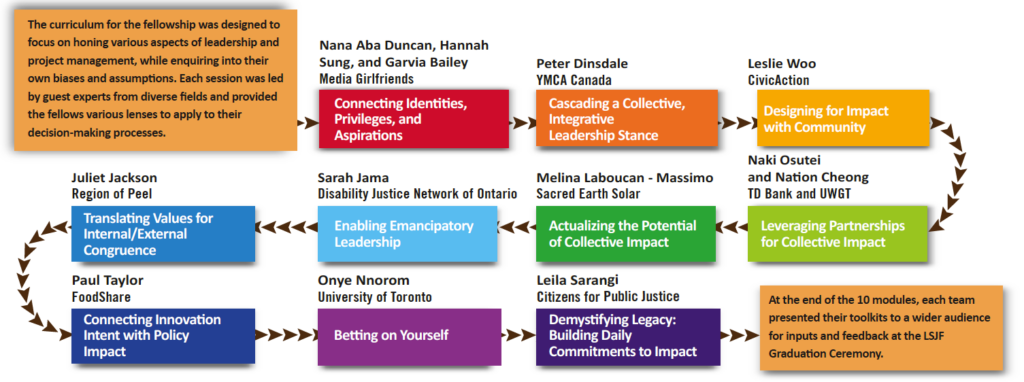In 2021, the inaugural group of 51 Fellows – organized in 17 teams of three – were mentored over a period of five months and offered theoretical and applied models informed by research within a peer-based setting, resources, and skills in the domains of organizational leadership, social innovation and inclusive design to help them build a toolkit unique to their social justice challenge.
This included an action plan to be used as a starting point for larger systemic change, as well as a personal leadership portfolio that outlined their personal and professional development goals related to furthering equity and inclusion. The fellows met virtually for interactive biweekly live learning sessions on Zoom which included group work.
Each session was led by cross-sectoral industry experts to engage the fellows in a sustained dialogue from diverse perspectives. Teams also received direction on moving their projects forward and creating accountability structures to help them inquire into assumptions and unknowns while identifying opportunities and resources.
The teams dealt with the following thematic areas:
- Creating reference documentation and programming to help first responders better approach mental health crises that prioritize the wellbeing of the person in need.
- Addressing transphobia + white supremacy in sports, beginning with a community soccer league.
- Creating a network offering space, community and support for youth focused on food justice.
- Collaborating with Black communities to ensure data is used to create positive changes in the lives of Black people, not as a weapon against Black lives.
- Identifying interventions to make hiring and career pathways more inclusive for diverse candidates in the construction industry.
- Addressing systemic racism in theatre and the arts, beginning with an organizational equity strategy.
- Advocating for decent and just work conditions for Personal Support Workers through building the Empower PSWs network.
- Disrupting the way community consultations and public transit projects are developed and prioritized by giving voice and power to community.
- Centralizing and increasing the ease in which Black entrepreneurs can identify, apply for and access funding.
- Rethinking funding practices to build equitable, community-based approaches to funding grassroots and BIPOC-led organizations.
- Challenging dominant narratives within our built environments through a public art and history initiative.
- Organizing arts-based workshops to explore the impacts of COVID-19 on woman service providers in the immigrant and refugee serving sector.
- Addressing the inequity and lack of career support, programs and pathways for Black Youth.
- Engaging community in storytelling about biking and walking in Scarborough to extend the benefits of active transportation equitably.
- Developing an intersectional campaign to empower Latinx youth with leadership skills and aspirational career pathways through mentorship.
- Bringing together diverse groups of youth and facilitating workshops and activities highlighting the specific issues they face.
- Bringing together organizations that work with youth to create more inclusive spaces and programs for physical activity.



